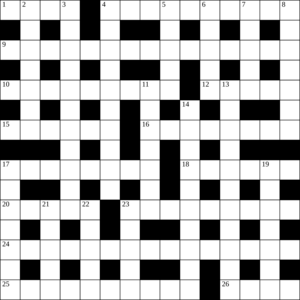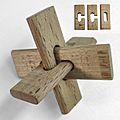Puzzle facts for kids
A puzzle is a fun problem that makes you think! It's like a brain challenge. Puzzles are often used for entertainment, but they also help you get better at logic and problem-solving. To solve a puzzle, you often need to find patterns or figure out how things fit together. People who are good at thinking logically usually enjoy puzzles a lot.
Puzzles come in many forms. You can find them in newspapers and magazines, like wordsearches, crosswords, and Sudoku grids. But puzzles can also be physical objects you put together, or even games you play on a computer screen.

Contents
What is a Puzzle?
A puzzle is a type of game or problem designed to test your cleverness. It asks you to use your brain to find a solution. Puzzles are not always easy, but that's what makes them exciting! When you solve a tricky puzzle, it feels great.
Why are Puzzles Fun?
Puzzles are a fantastic way to have fun while also learning. They can be a relaxing hobby or an exciting challenge. Many people enjoy puzzles because they:
- Help you focus and concentrate.
- Give your brain a good workout.
- Provide a sense of accomplishment when you solve them.
- Can be played alone or with friends and family.
Types of Puzzles
There are many different kinds of puzzles. Each type challenges your brain in a unique way.
Word Puzzles
Word puzzles use letters and words to create challenges.
Crosswords
A crossword is a grid where you fill in words based on clues. The words go across and down, and they share letters where they cross.
Word Searches
In a word search, you look for hidden words in a grid of letters. The words can be horizontal, vertical, or diagonal.
Anagrams
An anagram is a word or phrase made by rearranging the letters of another word or phrase. For example, "listen" can be rearranged to "silent."
Logic Puzzles
Logic puzzles require you to use reasoning and deduction to find the answer.
Sudoku
Sudoku is a number puzzle where you fill a 9x9 grid so that each row, column, and 3x3 box has all the numbers from 1 to 9, without repeating any.
Riddles
A riddle is a question or statement that is a puzzle to be solved. It often uses clever wording to make you think. For example, "What has an eye but cannot see?" (A needle).
Object Puzzles
These puzzles involve physical objects that you manipulate to solve the problem.
Jigsaw Puzzles
A jigsaw puzzle is made of many small, oddly shaped pieces that fit together to form a complete picture.
Rubik's Cube
The Rubik's Cube is a famous 3D puzzle. You twist its sides to get each face to be a single, solid color.
Tangrams
A tangram is an ancient Chinese puzzle. It uses seven flat shapes, called tans, which can be put together to form different figures.
Digital Puzzles
Many puzzles are now played on computers, tablets, or phones. These can include digital versions of classic puzzles or entirely new types of games.
Puzzle Video Games
Many puzzle video games challenge players with logic, strategy, or problem-solving tasks. Examples include games like Tetris or Portal.
How Puzzles Help Your Brain
Playing puzzles is like exercise for your brain! They help you develop important skills:
- Problem-Solving: Puzzles teach you how to break down a big problem into smaller, easier steps.
- Critical Thinking: You learn to analyze information and make smart decisions.
- Memory: Some puzzles, like Sudoku, can help improve your short-term memory.
- Patience: Solving a difficult puzzle often requires patience and persistence.
- Creativity: Sometimes, you need to think outside the box to find a solution.
Puzzles are a fun and educational way to keep your mind sharp and learn new ways to think!
Images for kids
See also
 In Spanish: Rompecabezas (juego) para niños
In Spanish: Rompecabezas (juego) para niños
 | Mary Eliza Mahoney |
 | Susie King Taylor |
 | Ida Gray |
 | Eliza Ann Grier |



